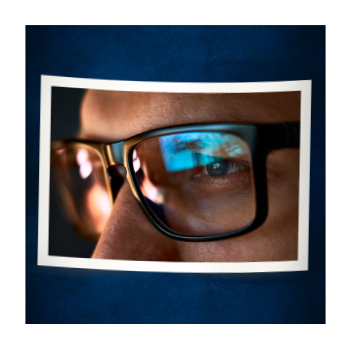


Sign-up for {N}power to get exclusive discounts, newsletters, members-only features, and more!

Lutein. Have you heard of it? Many argue that this carotenoid should be considered an essential nutrient because it is so crucial for human development and health. While much of the focus of lutein has been on its ability to enhance visual performance and protect our eyes from exposure to blue light, a growing body of research is showing that lutein’s reach goes beyond eye health. It plays a significant role in maintaining brain function as we age, it is essential for the infant’s developing brain, and it helps sharpen cognition at every age. Additionally, lutein has skin health benefits that include reducing the appearance of fine lines and wrinkles, as well as protecting the skin from harsh ultraviolet rays. It can even reduce stress and support mental health. Lutein is loaded with health benefits that more than meets the eye. And most of us just aren’t getting enough.
Read on to discover just how important lutein is, and what it can do for you.

 Blue light is among the shortest high-energy wavelengths in the visible light spectrum;1 LED, fluorescent and compact fluorescent lighting, computer screens, TVs, smartphones, and other smart devices all emit blue light.2 Over-exposure to blue light can cause eye strain (symptoms can include headaches, blurred vision, dry eyes, watery eyes, sensitivity to light, eye fatigue, etc.) and can cause damage to eye tissue, including the retina and macula, by increasing oxidative stress, leading to mitochondrial and DNA damage. Overtime, over-exposure to blue light can contribute to the development of dry eye disease, cataracts, glaucoma, and even the development or worsening of age-related macular degeneration (AMD).3 4 5 6 Over-exposure can also lead to poor quality sleep (this is why you always hear to avoid using your smart devices close to bedtime).
Blue light is among the shortest high-energy wavelengths in the visible light spectrum;1 LED, fluorescent and compact fluorescent lighting, computer screens, TVs, smartphones, and other smart devices all emit blue light.2 Over-exposure to blue light can cause eye strain (symptoms can include headaches, blurred vision, dry eyes, watery eyes, sensitivity to light, eye fatigue, etc.) and can cause damage to eye tissue, including the retina and macula, by increasing oxidative stress, leading to mitochondrial and DNA damage. Overtime, over-exposure to blue light can contribute to the development of dry eye disease, cataracts, glaucoma, and even the development or worsening of age-related macular degeneration (AMD).3 4 5 6 Over-exposure can also lead to poor quality sleep (this is why you always hear to avoid using your smart devices close to bedtime).
According to the Centers for Disease Control, the average American (including children and teens) spend about 7.5 hours each day on blue light-emitting screens.7 It should also be noted that because the eyes’ filtering system isn’t fully functional in children and adolescents, their retinas are exposed to more blue light, which means that there is a greater potential for damage.8
Dubbed “the eye vitamin,” lutein belongs to the carotenoid family of plant pigments that give yellow, red, and orange plants their rich color.9 It’s also the main pigment that makes up the macular pigment of our eyes. The macular pigment protects cells in the macula from the potentially harmful effects of high-energy blue light and lutein has been shown to have protective effects in the eye by increasing the density of macular pigment.10 Studies have shown that having a thicker macular pigment, known as macular pigment optical density, or MPOD, reduces the frequency of digital eye strain as well as improves overall visual function.11
One recent study investigated lutein’s effect on eye strain and sleep quality in 48 healthy young adults with at least six hours of daily screen-time exposure. Screen time and sleep quality were assessed via questionnaire and MPOD was also assessed.12Twenty-four mg of supplementation with lutein and zeaxanthin daily yielded significant improvement in MPOD and improved symptoms of eye strain, including headache frequency, eye fatigue, blurred vision, watery eyes, and sensitivity to light. They also found improvement in all visual performance measures, versus placebo. Additionally, sleep quality improved in those taking lutein. The study found that “Increased MPOD significantly improves visual performance and, in turn, improves several undesirable physical outcomes associated with excessive screen time.”13
There is also evidence that people with thicker macular pigment have a significantly lower risk of developing AMD (82% lower risk) compared to people with thin macular pigment, and that supplementation with 10 mg lutein + 2 mg zeaxanthin (another carotenoid that naturally occurs with lutein) can reduce the risk and slow the progression of AMD.14 A recent meta-analysis investigating the effects of lutein supplementation on MPOD in patients with AMD found that lutein supplementation at 10 or 20 mg daily was associated with an increase in MPOD, visual acuity, the ability to see details at a distance, and contrast sensitivity, the ability to see sharp and clear outlines of small objects. The higher dose increased MPOD in a shorter amount of time.15
Lutein is the dominant carotenoid found in the human brain and is critical for normal brain and eye development in fetuses. In fact, research has found that lutein concentrations increase by 41 percent from the first to third trimester of pregnancy and remain elevated after delivery—two critical periods of retina and brain development. Studies show that lutein is concentrated in neural tissues important for learning and memory and indicate that lutein may be related to brain volume regulation during development, neurotransmission, the development of neurons, and neuroprotection during fetal development.16 A recent study found that higher lutein intakes by the mother during pregnancy were associated with better verbal intelligence, behavioral regulation ability, and better social-emotional development in mid-childhood.17
Lutein is delivered to the fetus via the placenta and through breastmilk after birth. But a study of breast milk from nine countries showed that women in the United States had lower levels of lutein in their breastmilk, leading the researchers to write, “because placental and breast milk lutein are dependent on maternal consumption, which is low in the United States, understanding the impact of lutein supplementation and the effects on the mother and infant is important.”18
Research indicates that women of childbearing age, breastfeeding women, and children “do not ingest the amount of fruit and vegetable required to ensure an adequate intake of lutein and zeaxanthin.” Supplementation has been shown to effectively increase lutein levels in both the mother and child, via breastmilk.19
 Lutein remains an important carotenoid for the brain as children continue to grow and develop. Research has shown that children with a denser MPOD—which is also used as a marker for how much lutein is in brain tissue—not only performed better on cognitive tests, but did so with better brain efficiency, that is, their brains didn’t have to work as hard.20 Research has also found that thicker macular pigment in children is positively related to academic achievement21 and that supplementation with lutein and zeaxanthin (10 mg lutein + 2 mg zeaxanthin) improved cognitive function (specifically reasoning, memory, and attention) even in healthy college students “at the peak of their cognitive life.”22
Lutein remains an important carotenoid for the brain as children continue to grow and develop. Research has shown that children with a denser MPOD—which is also used as a marker for how much lutein is in brain tissue—not only performed better on cognitive tests, but did so with better brain efficiency, that is, their brains didn’t have to work as hard.20 Research has also found that thicker macular pigment in children is positively related to academic achievement21 and that supplementation with lutein and zeaxanthin (10 mg lutein + 2 mg zeaxanthin) improved cognitive function (specifically reasoning, memory, and attention) even in healthy college students “at the peak of their cognitive life.”22
Researchers have also found a significant correlation between the thickness of the MPOD and maintaining brain function as we age.23 A study including 4,076 adults aged 50 and older found that higher levels of lutein and zeaxanthin were associated with better scores in several measures of cognitive function, including memory, executive function (which includes reasoning and judgment, planning, focus, and regulating emotions), and better processing speed.24 Furthermore, three additional studies indicated that just 10 mg of lutein intake over 12 months had “a positive impact on healthy older adults' brain activities during learning, resting-state connectivity, and gray matter volumes.” And four cross-sectional studies found that lutein was positively associated with brain structure and neural efficiency during cognitive tasks.25
Lutein and zeaxanthin concentrate in the lipid layers of brain cells, where they help stabilize cell membranes and protect important fats, such as DHA, from oxidative damage.26 In addition to being powerful antioxidants, lutein and zeaxanthin have anti-inflammatory properties, enhance blood flow to the brain, and improve communication between neurons.27 28 29 They have also been found to increase brain-derived neurotropic factor (BDNF), which plays an important role in neuronal growth and also promotes brain plasticity, essential for learning and memory.30
 It might come as a surprise to learn that you can support healthy skin from within in just three months with lutein! In a 12-week study comparing 10 mg lutein + 0.6 mg zeaxanthin per day to a placebo, it was concluded that the powerful carotenoid combination provided significant improvement in skin hydration (60%), elasticity (20%), and resistance to UV exposure (75%), all of which can reduce the appearance of fine lines and wrinkles.31 The researchers aimed to bolster the antioxidant defense system of the skin as a potentially important strategy for reducing environmentally induced skin damage, concluding “oral administration of lutein may provide better protection than that afforded by topical application of this antioxidant when measured by changes in lipid peroxidation and photoprotective activity in the skin following UV light irradiation.”32
It might come as a surprise to learn that you can support healthy skin from within in just three months with lutein! In a 12-week study comparing 10 mg lutein + 0.6 mg zeaxanthin per day to a placebo, it was concluded that the powerful carotenoid combination provided significant improvement in skin hydration (60%), elasticity (20%), and resistance to UV exposure (75%), all of which can reduce the appearance of fine lines and wrinkles.31 The researchers aimed to bolster the antioxidant defense system of the skin as a potentially important strategy for reducing environmentally induced skin damage, concluding “oral administration of lutein may provide better protection than that afforded by topical application of this antioxidant when measured by changes in lipid peroxidation and photoprotective activity in the skin following UV light irradiation.”32
A separate randomized, double-blind, placebo-controlled 12-week study examined 50 healthy people ages 18–45 years with mild-to-moderate dry skin who were either given 10 mg of lutein + 2 mg of zeaxanthin or a placebo. Results from the study showed that the lutein-zeaxanthin group saw significant improvement in overall skin tone compared to the placebo group.33 After just three months, lutein really does provide noticeable improvements in skin health from every angle.
A study published in the journal Nutritional Neuroscience found that supplementation with lutein and zeaxanthin reduced stress, cortisol (the stress hormone), and improved emotional health in a group of young adults. The year-long study included 59 healthy young subjects who were either supplemented with 13 mg lutein, 27 mg lutein, or a placebo daily. Measures of blood cortisol, psychological stress ratings, and mood were taken at the beginning of the study, after six months, and again at 12 months. Supplementation for six months improved stress, cortisol levels, and measures of emotional health. The outcomes were either maintained or improved further at 12 months, with the researchers concluding, “Supplementation with the MCs [macular carotenoids] significantly reduces stress, cortisol, and symptoms of sub-optimal emotional and physical health.”34
Getting enough lutein to provide adequate protection to the eyes, skin, and brain is essential to good health. Lutein cannot be made by the body and instead must be obtained through the diet or supplements. Six to 20 milligrams of lutein a day is the amount believed to be necessary to reduce the risk of macular degeneration,35 but considering the importance of lutein to the skin and brain, 20 milligrams a day may offer better overall protection. Unfortunately, the average American adult consumes only 0.67-0.89 milligrams a day, a far cry from the suggested minimum of 6 milligrams a day, making supplementation important for most adults who want to reap the benefits of lutein.36 Supplemental lutein comes in two forms, free and esterified, and both have comparable bioavailability when taken with a meal containing fat. No matter which form you choose to get your lutein, it should be consumed with some healthy fat for optimal absorption.



Sign-up for {N}power to get exclusive discounts, newsletters, members-only features, and more!